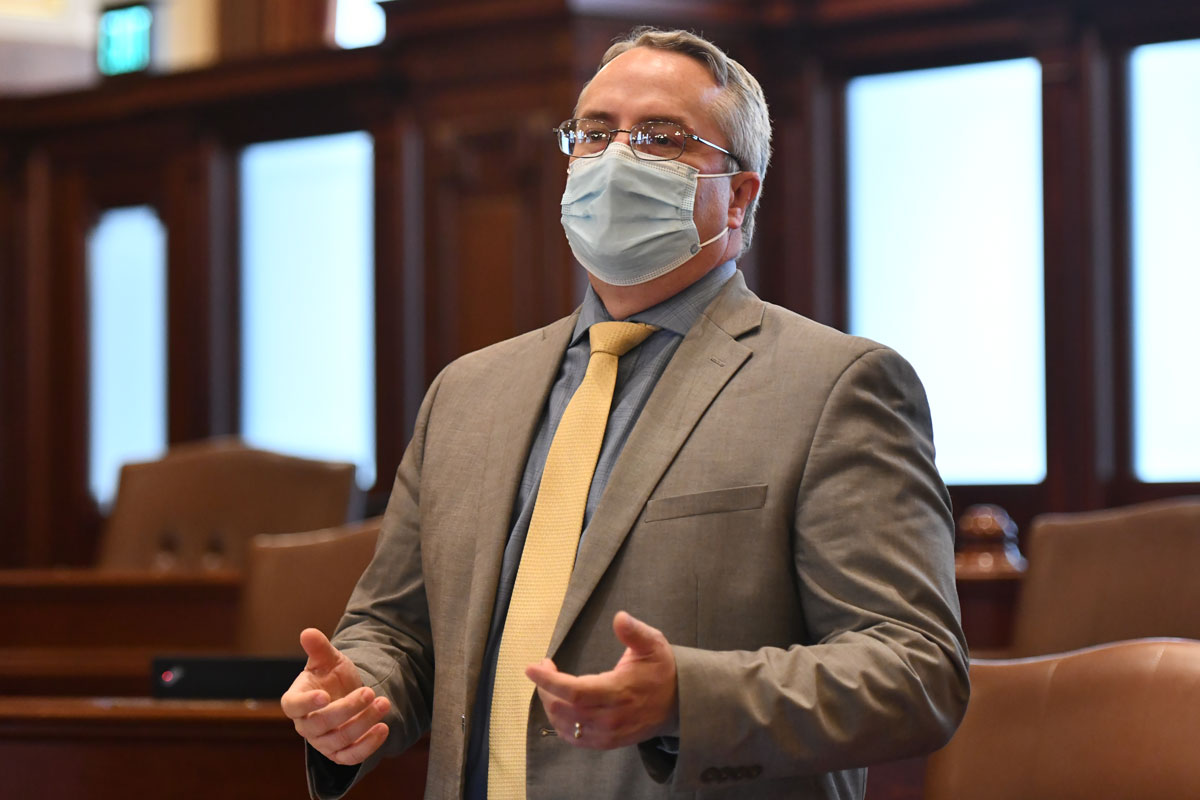- Details
- Category: Senator Sara Feigenholtz News

Measure paves the way to more efficient patient care
SPRINGFIELD – A bill sponsored by State Senator Sara Feigenholtz (D-Chicago) that allows Advanced Practice Registered Nurses to attest to their completed clinical hours was signed into law Friday.
“Our allied health care workers are stretched to the limit—especially during the COVID-19 pandemic,” Feigenholtz said. “This new law will assist Advanced Practice Registered Nurses who have completed their clinical training hours to self-attest and eliminate delays that some APRNs have been experiencing.”
Senator Feigenholtz was the chief sponsor of the original Full Practice Authority law, passed in 2017, and took the lead on this important follow-up legislation.
Read more: Feigenholtz cuts red tape for Advanced Practice Nurses
- Details
- Category: Senator John Connor News

SPRINGFIELD – The secretary of state will be required to publish publicly-accessible data on a daily basis under a new law sponsored by State Senator John Connor (D-Lockport) and signed Friday.
“Illinois is the only state that does not offer its business data for free online,” Connor said. “This legislation will bring us into the 21st century and will substantially increase our transparency and efficiency as a state.”
Under the new law, the secretary of state will be required to publish a daily list of all newly formed corporations, both business and non-profit, chartered on that day. The list will be made available as open data and accessible to the general public.
Read more: Connor’s new law creates increased business transparency in Illinois
- Details
- Category: Senator Suzy Glowiak Hilton News

SPRINGFIELD – To ensure students experiencing homelessness are aware of available resources, State Senator Suzy Glowiak Hilton (D-Western Springs) has created a housing insecurity liaison position at all higher education institutions in Illinois.
“Students without permanent housing may not be aware of the resources available to them on campus and in their communities,” Glowiak Hilton said. “By creating a housing insecurity liaison, we are working to prevent homeless students from falling through the cracks by connecting them with aid.”
Glowiak Hilton’s law requires each institution to appoint a Housing and Opportunities Useful for Students' Excellence (HOUSE) liaison. Their responsibilities would include identifying appropriate services, understanding aid eligibility, tracking graduation and retention rates, reporting the number of students using homelessness resources, and developing a plan to provide access to on-campus housing between academic breaks to homeless students enrolled at the institution.
Read more: Homeless college students will have more comprehensive support under Glowiak Hilton law
- Details
- Category: Senator John Connor News

SPRINGFIELD – Legislation sponsored by State Senator John Connor (D-Lockport) was signed into law Friday that would require stricter monitoring of possible racial bias by businesses that use artificial intelligence in their hiring processes.
“It is our responsibility to eliminate racial bias in all aspects of our society, and this is an important step in that direction,” Connor said. “No one should lose an opportunity because of the color of their skin.”
Artificial Intelligence is used in the hiring processes of many large companies. Prospective employees record a video of themselves answering a series of designated questions, and the company’s AI software then analyzes the video to assign scores to facial expressions, word choice, body language and vocal tone. Applicants are chosen for advancement based on their assigned score.
Read more: Connor’s new law identifies and addresses racial bias in AI hiring processes
- Details
- Category: Senator Jacqueline Y. Collins News

CHICAGO – Insurers will be required to inform policyholders whether health care providers offer telehealth or telemedicine and how they’ll accommodate a family caregiver under a new law signed by Gov. Pritzker today, the result of legislation by State Senator Jacqueline Collins (D-Chicago).
“The shift to telehealth during the pandemic has actually been something of an upside for patients who struggle with mobility challenges or a lack of ready access to transportation,” Collins said. “This law acknowledges that this is a new normal, and that patients need to be informed of their options as they determine their coverage. I want to thank Gov. Pritzker for signing this into law today.”
Senate Bill 332 also requires insurance providers to detail whether a health care provider has the ability and willingness to include a family caregiver who is in a different location than the patient in a telehealth or telemedicine encounter.
The legislation is effective immediately.
- Details
- Category: Senator Linda Holmes News

SPRINGFIELD – Federal policy on illegal smuggling and trafficking of exotic animals’ body parts has been strengthened, and Illinois needs to step up as well, according to Senator Linda Holmes (D-Aurora). Illinois prohibited the trade of ivory and rhino horn in 2018, but other animal species continue to face the threat of extinction due to demand. Holmes’ legislation that would lengthen the list of species banned in Illinois was signed by the governor Friday.
“Species are doomed to extinction if we don’t stop illegal smuggling and trafficking of their body parts,” Holmes said. “The Animal Parts and Products Ban will at least cut off the sales of these species’ parts in Illinois and help the global effort to save these animals from extinction.”
Read more: Holmes’ law forbids trafficking of exotic animals’ body parts
- Details
- Category: Senator Patricia Van Pelt News

SPRINGFIELD – A measure championed by State Senator Patricia Van Pelt (D-Chicago) to create the Task Force on Best Practices and Licensing of Non-Transplant Organ Donation Organizations was signed into law Friday.
“When people sign up to be organ donors, they are putting their trust in the fact that their organs will be properly kept, and used for science or educational purposes. Unfortunately, there have been cases where family members of the deceased suspected foul play,” Van Pelt said. “There needs to be more regulations in place in order to ensure the safety of organ donations.”
In recent years, the FBI discovered that Biological Resource Center Inc. in states including Illinois, Michigan and Arizona had been misusing donated body parts in a gruesome and criminal manner.
Read more: Van Pelt bill to create task force on organ donations
- Details
- Category: Senator Meg Loughran Cappel News

SHOREWOOD – A piece of bipartisan legislation, led by State Senator Meg Loughran Cappel (D-Shorewood) and State Representative Mark Batinick, that would expand the period of time in which school zone speed limits are active was signed into law today.
“Prioritizing the safety and wellbeing of our students is a choice,” Loughran Cappel said. “Reckless driving must be discouraged, especially in school zones,
Under current school speed zone rules, children are to be assumed present between the hours of 7 a.m. and 4 p.m. However, Plainfield-area high schools begin classes at 7:05 and students arrive during a timeframe when school zone rules are not yet active. Additionally, numerous students arrive before 7 a.m. to attend before school programs, tutoring or other extracurricular activities.
Read more: Loughran Cappel legislation to expand school zone times signed into law
More Articles …
Page 441 of 762













 © 2026 Illinois Senate Democratic Caucus
© 2026 Illinois Senate Democratic Caucus